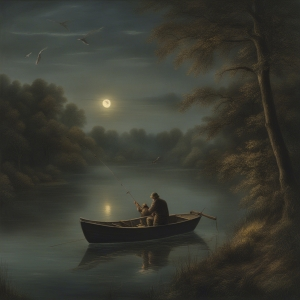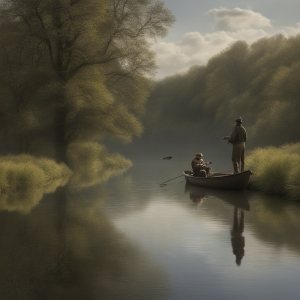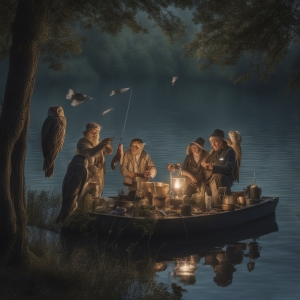Table of Contents:
Introduction to Night Fishing
Night fishing can offer a wholly unique experience and more bountiful rewards when done right. Under the veil of darkness, a new range of fish species comes out to feed and new methods of fishing can be applied. A 'night owl' angler may then find chasing that trophy fish to be an exhilarating challenge under the moonlit sky. But success with night fishing requires comprehensive understanding and a different approach than your typical daytime fishing.
For beginners and even experienced daytime anglers, this introduction to night fishing will expand your horizons. We're here to enthrall you with the breathtaking world of after-dark fishing. Let's delve into the basics, tips to navigate the night waters, and the gear you'll need for a successful catch in the dusky hours. So get ready for some nocturnal adventures on the water!
Understanding the Behavior of Fish at Night
Just like us, fish have their daily routines influenced by the cycle of light and dark. As night falls, fish behavior changes, offering a unique perspective to anglers. Know this: not all fish sleep at night! Many freshwater and saltwater species are nocturnal feeders, meaning they are most active at night.
These species include catfish, walleye, and crappie in freshwater environments. In the saltwater scene, fish such as snook, tarpon, and certain types of sharks are typically more active during the night.
Night-active species are typically drawn towards light sources, whether it's the moon, stars, or a light you have rigged on your boat. They mainly feed on smaller fish and insects, which are attracted to the light. By understanding these behaviors, you can adjust your strategy to maximize your opportunity for successful catches.
Pros and Cons of Night Fishing
| Pro | Con |
|---|---|
| Scenic under the stars | Low visibility |
| Less competition | Potential safety concerns |
| Different species become more active | Requires more preparation and gear |
| Cooler, more comfortable conditions | Disrupts normal sleep schedule |
Essential Gear for Night Fishing

Packing the right night fishing gear can make the difference between coming home empty-handed or with a bountiful catch. Here are some indispensable items to include in your checklist.
Firstly, a fishing headlamp. This will prove crucial for casting, reeling, and checking out your bait in the dark. Look for a dependable, weather-resistant headlamp that provides a good range of bright light.
Secondly, a boat light. If you’re angling from a boat, a mounted light will not only attract fish but will also ensure you are visible to other watercraft, enhancing your safety.
Don’t forget your glow-in-the-dark fishing lures. These luminous baits can draw in more fish, increasing your chances of hooking a catch.
An infrared thermometer is another great tool. With this, you can scan the water surface temperature, which can be invaluable in locating schools of fish.
Lastly, remember to take an anchor. When night fishing, it’s best to anchor down in one area to focus on your fishing. An anchor will ensure your watercraft stays put even in currents or breezes.
Ensure you pack your fishing essentials as well, including your rod and reel setup, a tackle box filled with the right hooks and leaders, and extra fishing line. With your gear checklist completed, you'll be perfectly prepared for a great night of fishing.
Safety Tips for Night Fishing
When embarking on a night fishing expedition, safety should always be prioritized. This is crucial because the darkness can add a level of complexity to the usual threats and risks of fishing. Here are vital safety tips to keep in mind:
Firstly, use a life vest. Even seasoned swimmers can get into trouble from unexpected conditions or accidents. Always wear a life vest while fishing, most importantly at night.
Secondly, ensure you have a first aid kit on hand. Hopefully, you won't have a need for it, but it's better to have it and not need it, than to need it and not have it available.
Another point to remember is to inform someone of your plans. Let them know when you plan to leave, where you will be fishing, and when you expect to return. Should anything unexpected happen, this information will be crucial.
Remember to carry an extra set of flashlights and batteries. The light sources will help ward off unexpected surprises like snakes and other hazardous creatures that can be found near water bodies at night.
Lastly, avoid consuming alcohol while fishing. Your reflexes, balance, and judgment can be affected by alcohol, increasing the risk of accidents.
Safety should never be compromised. Taking the necessary precautions will ensure you enjoy your night fishing experience while remaining safe.
Effective Techniques for Night Fishing

Now that you're aware of the unique behavior of fish at night and have your essential gear ready, let's dive into specific techniques that can make your night fishing more successful.
Firstly, consider using live bait. Nocturnal fish rely heavily on their sense of smell to find food, and using live bait can give off a scent that these fish will find appealing. Nightcrawlers, minnows, and shrimps are all great options.
Secondly, the technique of slow reeling. By slowing your retraction speed, you can better mimic the movement of night-time prey, potentially attracting the interest of more fish.
Moreover, try to take advantage of light. As mentioned before, many night-active fish are attracted to light. Therefore, using a florescent lure or setting up boat lights can attract both bait animals and predator fish.
Lastly, patience is a pivotal part of night fishing. With lower visibility, you may have to wait a bit longer until the fish find your bait. Be patient and you're more likely to reel in a great catch.
Remember, while night fishing does have its unique challenges, it can also be an extremely rewarding experience. It takes trial, error, patience, and most importantly practice. However, once you get the hang of it, night fishing can offer an entirely new dimension to your angling adventures.
Tips for Choosing the Perfect Night Fishing Spot
Even under the shroud of darkness, your choice of location greatly influences the outcome of your fishing experience. As different bodies of water and regions offer a variety of night-active species, the choice can pose an interesting challenge. So here are tips to aid you in selecting that excellent spot for a nighttime catch.
Start by gaining insights on the types of fish available in your chosen area. Talk to local fishermen or consult fishing forums and guides for information. Do some research on the best times to catch these fish. This groundwork gives you an advantage and increases your chances for a rewarding catch.
Opt for a spot that's close to home and familiar. Strange waters can pose unanticipated obstacles, especially at night. If you plan to fish in a new area, it could benefit you to explore it during the day first. This daytime reconnaissance will help you to familiarize yourself with the landscape, depth of the water, and possible hazards.
Consider fishing near shores that have natural, overhanging features, such as trees or bushes. These structures provide cover for fish, making them excellent spots to cast your lines. Sometimes, these spots may be bustling with activity, offering you a chance at a greater bounty.
Another element to consider is the water turbulence. Many fish tend to congregate in quieter, still waters. However, some species prefer waters with slightly higher turbulence like near a dam's outflows or river bends. As such, it is crucial to factor in this aspect too.
Your choice of fishing spot will make a significant difference in your night fishing success. By applying these tips, you're setting yourself up for a thrilling night of angling, replete with a hefty catch.
Conclusion: The Night Fishing Adventure

Immerse in the tranquility of the night and the thrill of the chase with night fishing. The allure of catching nocturnal species under a starlit sky offers a completely unique experience that transcends the ordinary realms of angling. As you adapt to this unconventional fishing practice, remember to learn, understand, and respect the creatures of the night.
It's not just about making a successful catch, but also appreciating the serene beauty of nature at night. An accomplished night angler blends passion for fishing with respect for nature and its inhabitants, making each fishing trip an enriching experience.
Remember, night fishing is an adventure that demands patience, understanding, and resilience. Now that we've equipped you with the essential knowledge and tips, it's time to take the plunge into the captivating world of night fishing. Apply the strategies shared in this guide, respect the water and its species, prioritize safety, and get ready to write your own success story in night angling.
Happy night fishing!
Frequently Asked Questions on Night Fishing
What is the best time for Night Fishing?
The best time for night fishing is usually when the fish are most active. This can vary depending on the weather, the time of year, and the type of fish you're trying to catch.
What gear do I need for Night Fishing?
A good fishing rod and reel are essential. Additionally, you will also need special night fishing gear like headlights, glow sticks, and electronic bite indicators.
How do I attract fish when Night Fishing?
Using illuminated and scented fishing baits can attract fishes. The light and scent draw fishes towards your bait, increasing your chances of a catch.
Is it safe to go Night Fishing?
Yes, night fishing can be safe if you take the right precautions. Always carry a first aid kit, let someone know where you are going to be, and bring a waterproof flashlight or headlamp.
Do I need a special fishing license for Night Fishing?
The requirements for fishing licenses vary by location. Some places may require a special license for night fishing while others may not. Always check the local regulations before going fishing.







